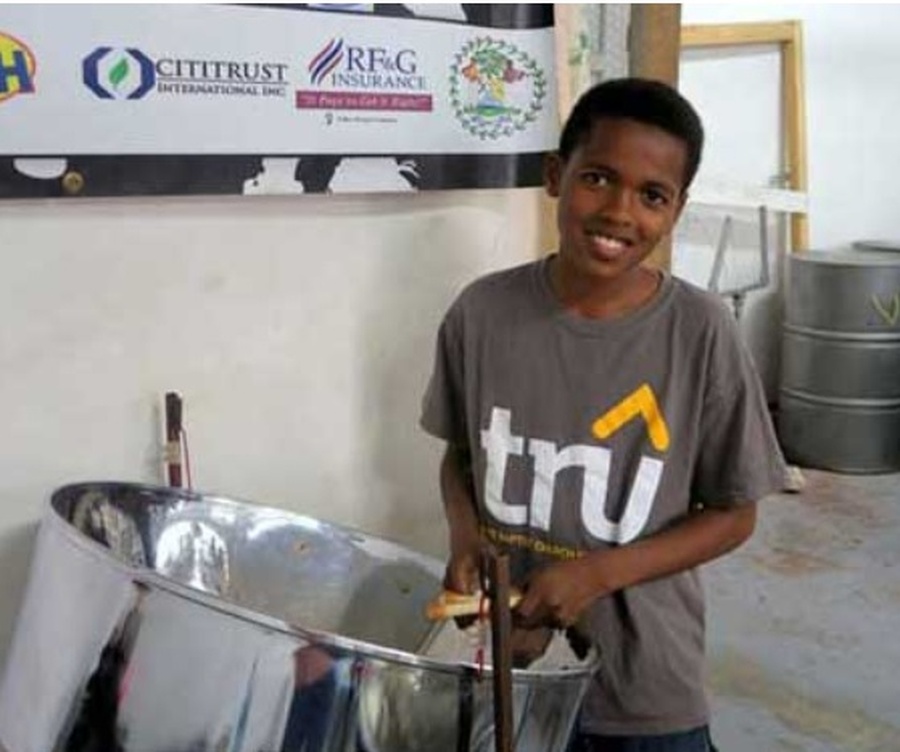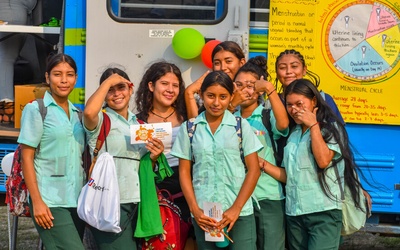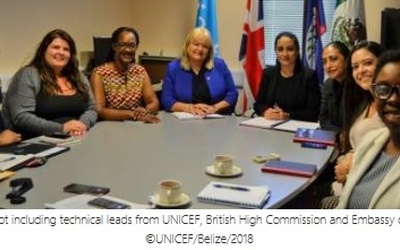.jpg)
The Steel Band Programme weekly practice in Belize City.
BELIZE CITY, Belize, 15 March 2017 - “The band is like a second family to me. After a hard day at school and some problems at home, I can come here, play music and enjoy myself.” Meet Mauricio: a 16-year-old from Belize City and an enthusiastic player of the Pandemonium Steel Band. “I have been playing here since the band was born. Somebody from Restore Belize came to my house to pick up my brother to go to steel pan class. I said, ‘I want to learn how to play the steel pan too!’ And here I am.”
How do you build a safe haven where children can express themselves? Base yourself in a gang-ridden area, set up biweekly steel pan classes for children to have fun and be out of trouble, involve the children so that they become exceptional players, and there you have it: a steel pan band that performs at public events in Belize and teaches children new skills, while keeping them off the streets.
Launched in 2013 by Restore Belize, a government agency focused on violence prevention, and the National Institute of Culture and History, the Steel Band Programme has so far impacted the lives of 200 children, and their families. UNICEF has been providing financial support to this one-of-a-kind initiative in Belize since the start.

Mauricio, 16, takes a break between rehearsing sessions of the Pandemonium Steel Band in Belize City.
“Coming here to learn how to play the steel pan gives children something to do with their spare time. After school, some of them would stay out on the streets of the south side of Belize City, which is a dangerous place. I used to live in that area myself. You can hear shooting. You try to block that all out, focus on your studies… but it’s difficult. You feel exposed to drugs, gang-related violence and alcohol. Here they get to interact with others and learn a skill. Music gives you more self-confidence, it gives you an identity,” explains Jarriel Hyde, 23, Assistant Band Director and Teacher.
A former Pandemonium Band player himself, Jarriel has been learning music since he was 5. Last year he was honoured to play in the famous Panorama Steel Pan Competition in Trinidad and Tobago, traditionally considered the home of steel pan music. “It was a historic moment and a really good experience,” he says.

Jarriel Hyde, 23, Teacher and Assistant Director of the Pandemonium Steel Band in Belize City.
Where do steel pans come from? Historically, they are recycled 55 gallon oil drums: the bottom is cut off and dents are hammered into the shiny metal surface. Each dent produces a different note to create a metallic stream of energizing music. When the Pandemonium children play, they seem to be transported into a different world: a world free from worry, where they can just be children.

Steel pans used by the Pandemonium Steel Band.
“What do I like the most about these classes? The actual music. And the energy that comes from it,” confirms Lyndajah, 14, who wants to be a lawyer when she grows up. “They also teach you about abuse,” she reveals.
In fact, the Steel Pan Programme not just about music. Periodically, professionals are invited to speak to the children about issues such as teenage pregnancy, HIV/AIDs and abuse, and to teach them practical life skills, like conflict resolution and team building. “We have life skills training for personal development; some kids don’t get that at home,” explains Jarriel. “Also, the band gives them a chance to be in positive company. Sometimes they ask us something related to school or family. We try to help them.”

Lyndajah, 14, is a junior player of the Steel Band Programme in Belize City.
The programme is about sharing, too: “sometimes we have a social and bring our parents,” says Mauricio. “We just bring food and talk, laugh and have a good time,” echoes 20-year-old Dominique. Dominique is a remarkable young woman, with plenty of personality and resolve. She says she’s always wanted to learn how to play the steel pan but never had an opportunity. One day she heard on the radio about the possibility to join Pandemonium, and decided that that was her chance to learn.
Despite growing up in a challenging environment, Dominique has big plans for herself: “I’ve always wanted to be a forensic scientist. Belize needs it. Today I do a lot of social work, I am a youth leader. I have no set career in mind for now… oh, but I want to become the Prime Minister of Belize! Progress doesn’t happen overnight. If you could change what happens inside the government you could change how people live their life.”

Dominique, 20, plays the steel pan while rehearsing with the Pandemonium Steel Band in Belize City.
“One of the biggest advantages of the programme is to give children from disadvantaged backgrounds the opportunity to learn music. This, coupled with our life skills programme on child protection, contributes to their self-development and self-expression,” explains Roger Bradley, Senior Programme Officer at Restore Belize in charge of the Steel Pan Programme. Being part of the band gives these children the opportunity to travel across the country to perform: “Many of them wouldn’t be able to do so otherwise… and many wouldn’t go to a steel pan concert either, if they weren’t performing: they could not afford the ticket [BZ$10, roughly US$5],” continues Mr Bradley.

Roger Bradley, Senior Programme Officer at Restore Belize, talks about the Steel Band Programme in Belize City.
The fact that people come out to watch them when they perform at public events builds a sense of pride in the children. Darriel confirms, “If you’re from the south side of Belize City, being in a band may not seem important in your community. Here people live by the day. They strive to survive. If you don’t get the right type of leadership you may go astray. There’s nobody to push you to go to school, nobody to talk to you. Poverty is a big issue as well. It’s really tough for some people.”
High violence and deprivation rates in the south side of Belize City (40 per cent of all murders in Belize happen here) triggered the need to create constructive activities in a safe space for children living in this area. As a result, the Steel Pan Programme was born, with the tag line “Beat a pan, not a man”.
This programme is part of PLAY (Programming Life-long Activities for Youth), a UNICEF-supported initiative to promote development in Belize through sports, music and dance, while teaching children about violence prevention, gender equality, HIV/AIDS and more. There is no doubt that the programme is working, and there is need for more. “Next steps include buying more steel pans and expanding to Yabra, an area in Belize City also infested with gangs,” explains Mr Bradley.
The Steel Pan Programme is a tangible example of the creative power of play to transform children’s lives. “When the band started everyone was a bit shy. Now, they are very expressive, mature and outspoken,” reports Jarriel with pride.
Paul, a shy 12-year-old with a bright smile, adds, “I have been coming here for a few years. It’s better to come here than to be on the streets… to learn new things. I didn’t know how to play steel pan before.” And when asked why he keeps coming back every week, he giggles, pauses and replies, “Because I just like it, Miss!”

Paul, 12, is attends the Steel Band Programme weekly practice in Belize City.




.jpg)











